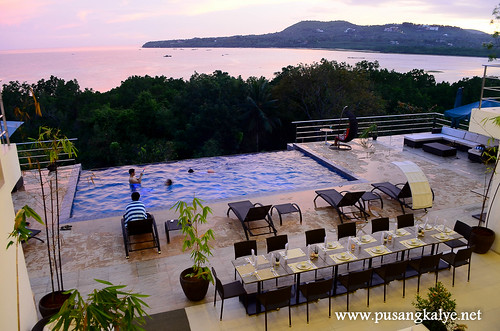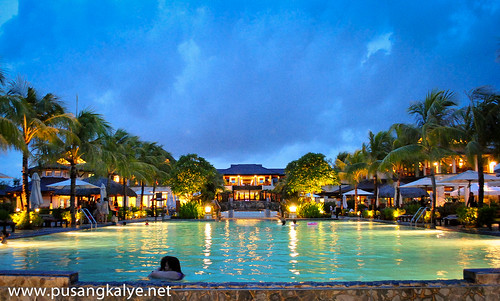I am giving way for another press release again, which I don't normally do, because I share the Philippine's tourism goals and efforts. Basta sa ikakaunlad ng turismo sa bansa full support tayo dyan. That is one of the reason after all why I am blogging travel. Cheers to all the efforts of DOT and all people involved. In context, DOT Sec. Jimenez said, "tourism should be everybody's business". Tama!
The Email:
Hi Anton,
Hope this finds you well. My name is Lynda and I’m from OCI Group, a marketing communications company and we are currently working with the Department of Tourism for the Philippines Improving Competitiveness project. As a background, the project was signed in agreement in April 2013 by the Department of Tourism, the Asian Development Bank, and the Government of Canada to increase employment in the tourism sector, which is critical in achieving inclusive growth.
The Philippine government has identified that the shortage of skilled labor and quality of service standards affects the international competitiveness of the tourism sector. In line with the country’s National Tourism Development Plan, which aims to bring in 10 million international visitors and 56 million domestic travellers by 2016, the demand for skilled labor in the tourism sector will continue to rise with new hotel developments requiring skilled labor.
Under the project, four pilot priority tourism destinations were identified — Bohol, Cebu, Davao and Palawan. The project is set to run for 38 months, and is expected to be completed in 2016. Part of the focus of the project is on the Hotel and Resorts Quality Assurance and Accreditation System.
The Email:
Hi Anton,
Hope this finds you well. My name is Lynda and I’m from OCI Group, a marketing communications company and we are currently working with the Department of Tourism for the Philippines Improving Competitiveness project. As a background, the project was signed in agreement in April 2013 by the Department of Tourism, the Asian Development Bank, and the Government of Canada to increase employment in the tourism sector, which is critical in achieving inclusive growth.
The Philippine government has identified that the shortage of skilled labor and quality of service standards affects the international competitiveness of the tourism sector. In line with the country’s National Tourism Development Plan, which aims to bring in 10 million international visitors and 56 million domestic travellers by 2016, the demand for skilled labor in the tourism sector will continue to rise with new hotel developments requiring skilled labor.
Under the project, four pilot priority tourism destinations were identified — Bohol, Cebu, Davao and Palawan. The project is set to run for 38 months, and is expected to be completed in 2016. Part of the focus of the project is on the Hotel and Resorts Quality Assurance and Accreditation System.
In light of this, we would like to share with you the recent article that gives an update on this particular output. According to the initial findings of a team of International Accommodation Assessors (IAAs) who joined the Department of Tourism (DOT) in conducting a national review of accommodation standards in July, Philippine hotels and resorts in key island destinations are ready to compete in the global marketplace.
PRESS RELEASE
Philippine hotels and resorts in key island destinations are ready to compete in the global marketplace, according to the initial findings of a team of International Accommodation Assessors (IAAs) who joined the Department of Tourism (DOT) in conducting a national review of accommodation standards last month.
The team of IAAs composed of ten experts from different countries said Philippine hotels and resorts including the small players have 'very high standards' in keeping the unique Filipino hospitality, one of the country's competitive advantages.
“The warmth of welcome for guests in all types of accommodation is almost unique among international destinations. There is a real potential for the Philippine tourism industry. Some hotels and resorts need to invest to improve, but the new rating system can help identify where to focus that investment,” the initial report noted.
New standards under the Hotel and Resorts Quality Assurance and Accreditation System aim to assist visitors in terms of the quality, service and comfort provided by accommodation businesses of all sizes and types in the Philippines.
The system which was launched last year reviewed 144 hotels and resorts in the country's main island destinations such as Cebu, Bohol, Davao and Palawan. The DOT tapped international assessors to ensure that the review is based on accepted international standards. The review itself is part of a technical assistance funded by the Government of Canada and administered by the Asian Development Bank (ADB) aimed at improving competitiveness in the tourism sector, in time for the Association of Southeast Asian Nations (ASEAN) integration. ASEAN member countries include the Philippines, Indonesia, Thailand, Malaysia, Vietnam, Singapore, Cambodia, Laos, Myanmar and Brunei.
Undersecretary Maria Victoria V. Jasmin, Chairperson of the DOT Project Steering Committee, said the technical assistance is crucial in helping the department to implement Improving Competitiveness in Tourism, a roadmap designed to increase foreign tourist arrivals to ten million by 2016.
“Data will be carefully analyzed in order to further strengthen and develop the accommodation standards system and enable us to compete at the highest international levels in the future,” said Undersecretary Jasmin.
Undersecretary Jasmin added, “these new standards will help guide Philippine hotels and resorts on where they could invest to further improve their businesses. They are shown to be equally effective in identifying excellence, enabling the finest properties and managers to show the way for others. The standards clearly identify examples of best practice for use by all types and levels of accommodation.”
Hotel owners and senior managers in all the properties visited welcomed the new set of standards as they see it as a significant improvement on the old standards introduced in 1992. “Owners and managers welcomed the introduction of the internationally understood one to five star grading approach. They understood that not everyone can be, or should be, five stars and that some of the most successful hotels and brands internationally hold two or three stars,” Undersecretary Jasmin said.
Final results of the assessment will be released in September 2014.
____________________
PRESS RELEASE
PRESS RELEASE
Philippine hotels and resorts in key island destinations are ready to compete in the global marketplace, according to the initial findings of a team of International Accommodation Assessors (IAAs) who joined the Department of Tourism (DOT) in conducting a national review of accommodation standards last month.
The team of IAAs composed of ten experts from different countries said Philippine hotels and resorts including the small players have 'very high standards' in keeping the unique Filipino hospitality, one of the country's competitive advantages.
“The warmth of welcome for guests in all types of accommodation is almost unique among international destinations. There is a real potential for the Philippine tourism industry. Some hotels and resorts need to invest to improve, but the new rating system can help identify where to focus that investment,” the initial report noted.
New standards under the Hotel and Resorts Quality Assurance and Accreditation System aim to assist visitors in terms of the quality, service and comfort provided by accommodation businesses of all sizes and types in the Philippines.
Undersecretary Maria Victoria V. Jasmin, Chairperson of the DOT Project Steering Committee, said the technical assistance is crucial in helping the department to implement Improving Competitiveness in Tourism, a roadmap designed to increase foreign tourist arrivals to ten million by 2016.
“Data will be carefully analyzed in order to further strengthen and develop the accommodation standards system and enable us to compete at the highest international levels in the future,” said Undersecretary Jasmin.
Undersecretary Jasmin added, “these new standards will help guide Philippine hotels and resorts on where they could invest to further improve their businesses. They are shown to be equally effective in identifying excellence, enabling the finest properties and managers to show the way for others. The standards clearly identify examples of best practice for use by all types and levels of accommodation.”
Hotel owners and senior managers in all the properties visited welcomed the new set of standards as they see it as a significant improvement on the old standards introduced in 1992. “Owners and managers welcomed the introduction of the internationally understood one to five star grading approach. They understood that not everyone can be, or should be, five stars and that some of the most successful hotels and brands internationally hold two or three stars,” Undersecretary Jasmin said.
Final results of the assessment will be released in September 2014.
____________________
PRESS RELEASE



Comments
Post a Comment